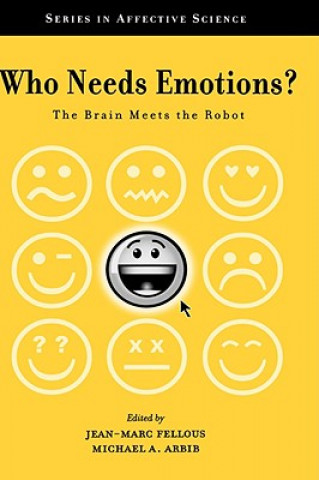
Kézbesítés
Vásárlási tanácsadó





Nem vált be? Semmi gond! Nálunk 30 napon belül visszaküldheti
 Ajándékutalvány
bármilyen értékben
Ajándékutalvány
bármilyen értékben
Ajándékutalvánnyal nem nyúlhat mellé. A megajándékozott az ajándékutalványért bármit választhat kínálatunkból.
Who Needs Emotions?
 Angol
Angol
 350 b
350 b
30 nap a termék visszaküldésére
Ezt is ajánljuk


The idea that some day robots may have emotions has captured the imagination of many and has been dramatized by robots and androids in such famous movies as 2001: A Space Odyssey's HAL or Star Trek's Lt. Commander Data. By contrast, the editors of this book have assembled a panel of experts in neuroscience and artificial intelligence who have dared to tackle the issue of whether robots can have emotions from a purely scientific point of view. The study of the brain now usefully informs study of the social, communicative, adaptive, regulatory, and experiential aspects of emotion and offers support for the idea that we exploit our own psychological responses in order to feel others' emotions. The contributors show the many ways in which the brain can be analyzed to shed light on emotions. Fear, reward, and punishment provide structuring concepts for a number of investigations. Neurochemistry reveals the ways in which different "neuromodulators" such as serotonin, dopamine and opioids can affect the emotional balance of the brain. And studies of different regions such as the amygdala and orbitofrontal cortex provide a view of the brain as a network of interacting subsystems. Related studies in artificial intelligence and robotics are discussed and new multi-level architectures are proposed that make it possible for emotions to be implanted. It is now an accepted task in robotics to build robots that perceived human expressions of emotion and can "express" simulated emotions to ease interactions with humans. Looking towards future innovations, some scientists posit roles for emotion as a powerful self-motivational tool as well as a way to work effectively in a group. But daunting questions remain as we ask what may be the nature of emotions in future generations of robots that share neither our biological heritage nor our need to share emotions with our fellow humans. All of these issues are covered in this timely and stimulating book which is written for researchers and graduate students in neuroscience, cognitive science, psychology, robotics and artificial intelligence.
Információ a könyvről
 Angol
Angol
Kategória




 Hogyan vásároljunk
Hogyan vásároljunk























